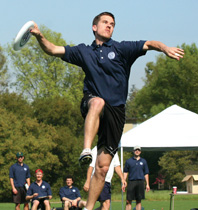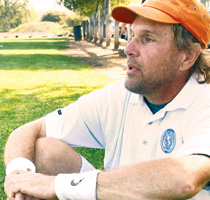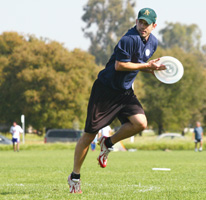home | metro silicon valley index | features | silicon valley | feature story

Photographs by Felipe Buitrago
Disc Drive: The first Dischoops tournament in Palo Alto attracted players from the Bay Area's devoted Ultimate Frisbee community, but some are opposed to the
new offshoot.
The Ultimate Controversy
Cupertino's Crazy Frank is trying to turn the culty world of Ultimate Frisbee upside down—and he's driving enthusiasts nuts in the process. Can he drag the Bay Area's favorite underground sport kicking and screaming into the mainstream?
By Najeeb Hasan
Cupertino's Frank Huguenard is uncharacteristically nervous. He's arrived early to the Stock Farm fields near the Stanford Hospital in Palo Alto on this Saturday in March to chalk two fields in preparation for the first tournament of his brand new sport.
Huguenard has been organizing the tournament for weeks—asking, cajoling, pleading with top players from the Bay Area's thriving Ultimate Frisbee community to participate in his tourney debut of Dischoops, a spin-off game that Huguenard created with the objective of dethroning Ultimate as the king of disc sports.
Many of them think he's crazy. But then, he's Crazy Frank.
It's a nickname he picked up, in fact, while pursuing his separatist agenda, and indeed anyone familiar with the obsessive devotion of Ultimate Frisbee's followers may think he's actually insane to be not only challenging but even insulting one of the cultiest sports in the world. But he considers the nickname a point of pride.
And Huguenard surprised naysayers by drawing some of the region's more gifted Ultimate players to his Dischoops tournament, including top club players Ian Ranahan and Taylor Casino. The tournament morphed into a series of exhibition games because there were only enough players to suit up two teams, but the founder of the sport was ecstatic. He was particularly giddy about Idris Nolan, the top Ultimate player he had targeted. Not because Nolan had showed—he ultimately ditched the tournament for a bachelor party—but because he had even considered coming, after mocking Dischoops when Huguenard first unveiled it online. Apparently, he'd changed his mind about the new game after playing in a few pick-up games.
"He had said to me, 'I'm starting to like this,'" Huguenard says. "'We're going to find out [during the tournament] whether you're an idiot or a genius.'"
Huguenard seems perfectly content to be at the center of the sport's biggest controversy. He looks at the field and grins like a proud parent as the players sprint back and forth between the goals.
"My message has been consistent and outrageous," he says. "It's like going to a bunch of people who are all addicted to Methadone and saying, guys, there are better things to be addicted to."
Then just as quickly, after basking contentedly for a moment in the first organized action of his new sport, he calls a foul from the sidelines on a player. The player, not used to Dischoops' new rules, tosses the disc aside and mutters, "Yeah, whatever, dude."
"That's a yellow card!" yells Huguenard. Then he mutters, "Fucking asshole—that's the person I loathe. Who the fuck are you? You got no game and come in here talking smack."
The guy is crazy.

Crazy About Ultimate: Frank Huguenard seems perfectly content to be at the center of Ultimate Frisbee's biggest controversy, with his aggressive promotion of Dischoops, an offshoot of Ultimate that he created.
The Spirit of The Game
Huguenard has plenty of issues with Ultimate: its accessibility for unskilled players, its frequent stops of play when the opposing team scores and its notoriously inflexible governing players association.
But the central focus of his ire has been Ultimate's unique "Spirit of the Game" officiating standard, a legacy of the game's counterculture origins that essentially hands refereeing duties to the players on the field who are advised to be honest and stay true to the game's free spirit, rather than to a grim enforcer in zebra stripes as is the case in all other competitive team sports.
The standard works fine in pick-up games in parks (even then, arguments often erupt), but Huguenard believes it falls woefully short for a serious, competitive sport, much less a commercial sport. Recently, the players association reluctantly agreed and introduced an "observer" to official games and tournaments; the "Spirit of the Game" still rules, but the observer is required to settle any on-field disputes.
The independent spirit of Ultimate has undeniably been its undoing in the mainstream. In 1974, the Frisbee manufacturer Wham-O noticed the cult success of the game and attempted to capitalize. Wham-O created the game Netbee, a cross between Ultimate and soccer, where scores were determined by the Frisbee being thrown into a net as opposed to being caught by a player in the end zone. The Rose Bowl in Pasadena was rented out and mainstream television coverage successfully wooed. But Wham-O's attempt ended up a miserable failure, as Ultimate purists refused to sell out their sport.
As a result, Wham-O has been so marginalized by the Ultimate community that Frisbees, a trademarked Wham-O brand, are not even used; rather, the most common disc used in competition is one made by Wham-O competitor Discraft.
In the 1980s, the tequila-maker Jose Cuervo sponsored 10 Ultimate tournaments and offered cash prizes of up to $10,000 for the winners. After a few of the tournaments were played, the group that the tequila giant had put in charge of organizing the tournaments approached the players association with some ideas for modifications, including adjusting the "Spirit of the Game" rule, to make the sport more spectator friendly. The players association refused the suggested modifications, and Jose Cuervo pulled its funding, effectively ending the tournaments.
Pasquale "Tony" Leonardo, an Ultimate historian based in Brooklyn, New York, and co-author of Ultimate: The First Four Decades, describes Ultimate as a "we've almost made it into the Big Time" sport. In the '70s, it was with the Rose Bowl; in the '80s, it was the rocketing mainstream success of fellow cult sport beach volleyball; in the '90s, it was Ultimate's successful spread into the ranks of college club-level sports (today, the college championships are even covered by cable television). Even today, Ultimate is poised to spread deeply into the high school sporting scene in several important communities.
"Everyone believes that Ultimate is always on the cusp of breaking through," says Leonardo.
It never does, however, and Leonardo believes there are a number of reasons why.
"First," he says, "Ultimate players haven't seen the need. Imagine hockey when Fox put the blue track on the hockey puck. Hockey players said, 'Fuck that bullshit.' Two is that the pace of the game is not quite conducive to watching it. Then, the marketplace for sports in America is not ready for it—not enough people know about it; it still has an image of a sport being played by counterculture hippies who aren't competing for real, which plays against the desire to watch real competitions."
"The people that started this sport often are referred to as a bit anti-establishment," says Joe Siedler, a San Francisco resident and former board member of the Ultimate Players Association. "The players thought they knew what they wanted, and what they created stuck. To this day, out of 25,000 members of the UPA, it wouldn't surprise me if 15 to 20,000 don't want the sport to change at all, don't want refs, don't want outside sponsors telling them you gotta change this rule to make it better to video."
Siedler compares it to the original Olympics: all effort and no money involved.
"Even if you win the national champs, all you get is the accolades of your peers," he says. "You'll go to work on Monday and no one will ask you how you did because they don't have a clue about Ultimate. The only reward is the self-satisfaction."
The First Whirled War
In the summer of 2005, shortly after Huguenard earned his nickname, he took a trip down south to San Diego to take part in a Goaltimate tournament, a spin-off sport from Ultimate.
In his own estimation, Huguenard, who is now 47 and lives in Cupertino with his ex-wife, arrived ridiculously cocky. He was the best Goaltimate player in the world, he told the event's organizers, who were in fact the sport's founders.
His skill set, he claimed, was perfectly suited for the game. Ultimate requires mastering only two basic throws, the forehand and the backhand, and the speed to cover the 120 yards from one end zone to the other. Huguenard said he was proficient in several throws—he said he even invented some throws—and had developed precise and dazzling footwork, which complemented the shorter, quicker half-field game of Goaltimate.
The tournament, organized under the auspices of the California State Games, a United States Olympic Committee-associated organization meant to create an Olympic-like atmosphere for amateur athletes, featured two of Ultimate's early pioneers: Jim Herrick, a legendary Ultimate player credited with inventing Goaltimate in 1978, and Rick Conner, a native Texan and high-level Ultimate enthusiast who had relocated to San Diego and, in 1999, trademarked Goaltimate in a so far ill-fated attempt to propel the sport into the mainstream of American athletics.
After Conner had trademarked Goaltimate in 1999, he liquidated his life's savings—several hundred thousand dollars—to promote and commercialize the sport. Today, he describes his strategy as "idiotic," wishing he had instead worked to popularize the sport in the grassroots, rather than spending money on the national level. With his own money, Conner set up a series of tournaments that featured the top Ultimate players in the world. He paid to produce the games on ESPN, he picked up the tab on flying the teams in from as far away as Australia, and he even put up $30,000 winners purses.
Soon, he was out of money. His result was not the new American sport that he was looking for, but a sort of companion sport to Ultimate, whose institutions advertise Goaltimate as such on their websites and whose top players often cross-train with the quicker Goaltimate to increase their skill levels.
The way Huguenard remembers the 2005 tournament, his game supported his talk.
"I'm saying, I'm going to play in tennis shoes [the tournament's other players competed in cleats], and you can't stop me," he recalls while relaxing at a Sunnyvale coffee shop after a Wednesday afternoon disc game at nearby Raynor Park. "And I backed it up. This guy Jim Herrick was like, 'What the fuck? You're not running hard, you're in sneakers, and you're unstoppable.'"
Herrick pretty much supports Huguenard's recollection.
"I loved that Frank came to the tournament," he says. "It was historic and he needed to be there, and the community needed to see him. I've always been of the opinion that if you can do it, it ain't bragging."
But Conner remembers things differently.
"He was average," says Conner, speaking from his office in San Diego. "He came on the team telling them that he was the best Goaltimate player in world—these guys were top level players, probably each and every one of them was a better player than he was. [His team] ended up coming in last place, but he still insisted he was the best player. He was far from it—I've played against the best players in Ultimate and Goaltimate, and I know what they are made of; he was far from it, in his disc skills and everything else. I don't think you'll find anybody that says Frank is one of the elite players in the world—except for him."
Huguenard attempted to convince Conner to partner with him in putting a new version of Goaltimate out that incorporated his Dischoops rules—some of the changes he wanted included making Goaltimate full-field (as opposed to half-field), adding a self-pass component in which players could pass the disc to themselves (Huguenard envisioned it being similar to dribbling in basketball) and making the traveling, or pivot, rule more strict, like basketball (both Ultimate and Goaltimate allowed a degree of dragging the foot once the disc is caught, due to the speed of the games).
"I definitely agreed with some of his perspective on the game," says Conner. "But if you don't agree with everything that Frank has to offer, he becomes inflammatory. It was difficult for me to continue my relationship with him. He does have good insight to disc, and he's been playing long enough where I respect a lot of what he has to say. If he's able to make Dischoops into a bigger game, that's great for him, and it's great for all disc games."

Big Score: Ian Ranahan is one of the top Ultimate players Huguenard wooed to the first Dischoops tournament in Palo Alto in March.
The Politics Of Discing
Huguenard, who has been playing Ultimate since he picked up the sport at Purdue University in 1979, was never able to make a name for himself on a national level. And while he'll readily describe himself has the "most accomplished player on the planet" and as a "local legend" because of his ambidextrous disc handling and explosive footwork, he has never appeared in the sport's national or international championships.
His fatal flaw, he admits, was his impolitic, argumentative bent; he describes the entire decade of the '90s as "miserable" because he had to constantly contest foul calls (known as violations) that he believed weren't fouls.
He finally concluded that the rules of Ultimate were decidedly rigged against a person of his skill set.
"Most people, when they watch me play, they don't know what they're looking at," he says. "I have some of the best moves in the game, and some average player on the field makes a call on me."
Two years ago, he watched the cult skateboarding hit Dogtown and Z-Boys, a documentary that told the story about a group of surfers who revolutionized the sport of skateboarding, and made it a commercial phenomenon. The movie resonated with Huguenard, and he was now on a mission to do the same with Ultimate, a sport he is convinced will never be able to transcend its cult, rec-league status. He took on the online pseudonym Billy Berrou (a character in the movie Caddyshack) and launched a blogosphere broadside against Ultimate's most hallowed characteristics, including the Spirit of the Game. Rather than make alliances with the Ultimate community, he made enemies.
"Crazy Frank Huguenard is regarded as a complete idiot in most Ultimate circles," one national Ultimate figure says in an email. "He is mildly entertaining, but far more irritating. His fantastical ideas and dreams are a madman's whimsy." Huguenard's critique of the game has been almost universally panned by locals, who say they have been turned off by his abrasive manner in addition to philosophical differences.
"They [Huguenard's critiques] are based on Frankisms," says Mike Sexter, a 46-year-old software engineer in the South Bay who moonlights as the executive director of the South Bay's Ultimate club. "Frank is a phenomenal athlete. If he weren't so anti-everything, he could participate in a higher level of Ultimate. Frank just wants everything his way. His main strategy in Ultimate never worked; it always failed, and he always had some excuse why. His strategy is that he wants everybody to throw the Frisbee to him, so he could have fun at everybody else's expense."
Huguenard, meanwhile, draws a parallel between the battle over Ultimate and the Cold War, saying he needs Ultimate "defectors" in the same way that the United States needed Soviet defectors.
"The defections will be the sound heard around the world," he says. "Currently, among top players, Ultimate is getting priority over Dischoops. If I can get the upper core of players preferring Dischoops [to Ultimate], then change will happen."
"He's kind of a dreamer," says Ian Ranahan, a top-level Ultimate player in the Bay Area who has played Dischoops. Of Dischoops, Ranahan says, "It's fun; it's fast-paced, and I certainly agree with some of the rule changes that Frank made. But, I'm not going to give up Ultimate."
Siedler says the UPA's current board is in a major strategic evaluation plan and examining, among other issues, the question of professionalizing the sport. His personal opinion on whether Ultimate should go commercial is—like many of those associated with the sport—ambivalent. "I'm all over the place," Siedler says. "The sport is so awesome to watch. ... I don't care if it ever goes professional."
While Huguenard hasn't found his high-level defectors yet, he has mortgaged his reputation on Dischoops.
"Ultimate is evil," he says. "Ultimate encourages ignorance, and ignorance is evil."
See? Crazy.
Send a letter to the editor about this story.
|
|
|
|
|
|